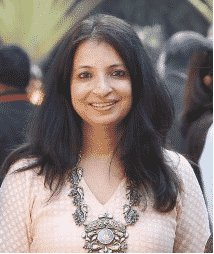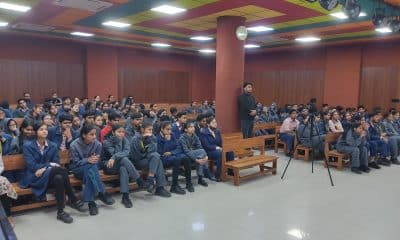In Conversation
Sensitization, training of medical fraternity, key to augment organ donation in India: Sunayana Singh
“Scarcity of organs is a worldwide phenomenon but India lags far behind compared to other countries owing to a host of factors-ignorance, socio-religious beliefs, lack of medical facilities and organ retrieval centres among others,” says Sunayana Singh, CEO and co-founder of ORGAN India, an initiative by the Delhi-based NGO Parashar Foundation, that aims to address the dismal state of organ donation in India. Launched in March 2013, Organ India works to help people understand the significance of organ donation and enable a seamless mechanism to facilitate this change.
In an interview with The Plunge Daily, Ms Sunayana Singh discusses various challenges to organ donation in India underlining the need to create awareness through various mediums and platforms.
Q: The organ donation rate has improved in India but still there is a huge gap between demand and supply. This could be attributed to lack of awareness, religious beliefs, superstition and many other reasons. So, how can we overcome this challenge? What role does Organ India play in tackling this challenge?
A: The organ donation rate in India right now is less than 1 per million population which is low. The organ donation rate in most of Europe is approximately 30 per million. Spain for example, is a global leader with an average of 50 donations per million. In the US, the average donation rate is 36 per million.
While many factors have contributed to the improved rate of donation in India also but there is still a huge gap that continues to fuel the crisis. Lack of awareness is definitely one of the factors but more importantly, it’s the lack of training and sensitisation of the medical fraternity. There needs to be more awareness, efficient logistics especially in the smaller cities.
The challenges in rural and urban areas are different as well. So there needs to be a systematic approach to tackle these issues. We need to set up retrieval centres especially in smaller cities so that organs can be retrieved even if the transplant facilities are in the metros. Know-how in the medical fraternity is crucial. The deceased donation program suffers from a deficient intensive care facility, manpower, fewer transplant centres, government hospitals, lack of infrastructure to run the program, lack of trained personnel especially surgeons, and lack of confidence in declaring brain death and handling and approaching the deceased’s family.
Sometimes there needs to be proper coordination between authorities and the police if it is a medico-legal case. So from procurement to transplant, the process is long and peppered with difficulties which add to this disconnect. Organs are not retrieved from thousands of brain-dead patients which could help a lot of critically ill patients hanging by a thread and fighting for their life. While it’s tough to say exactly what the figures are, it is estimated that there are almost half a million people who are suffering from organ failure, and less than 3% of them receive a life-saving organ.
Where ORGAN India steps in is we have a two-fold approach. We not only aim to create public awareness but also guide recipients and make them understand the process so that they are able to register themselves and are aware of their options. Sensitization of the medical fraternity towards this process is also something that we do. Currently, we have a tie-up with the several Districts Administrations in Haryana under the Chief Ministers Good Governance Associates program that started the organ donation program as a pilot program in 4 districts.
Besides this, both our online and offline presence helps in connecting the medical fraternity including students to connect with experts from all over the world and understand and learn about organ donation first-hand from the pioneers.
We offer paramount patient support for patients and their families. There is a directory on our website, first-of-its-kind where we have mapped out the entire process including what hospitals offer transplants, how to make appointments, where to stay around the hospitals, and who are the concerned teams. Our chairperson Mrs. Kirti Parashar had a heart transplant and at the time the family went through a lot of obstacles. This pushed us to go far and beyond and map out this kind of information in all of India for different transplants so we can extend this help to other people going through this.
Also Read: Matrix Partners, Accel lead USD 7 mn seed round in Nakad
We have also set up a 24X7 helpline manned by our team to make sure that we are prompt in our responses. We get almost 250 calls a month and our team coordinates many eye and body donations.
An instrumental part of the change has been our direct connect with the public in raising awareness. The outlook has changed a lot in the past 8 years and there’s been a change also in how the media covers organ donation. We make sure that the message that goes out is positive. We put up banners and posters in hospitals and public health centres. Our current initiative is commissioning wall paintings, especially in the two-tier cities that will help people understand the process.
The Delhi government had also issued two directives to schools to ensure there are talks on organ donation once a year in schools and we covered over 100 schools. After Covid of course that slowed down. Just as the ‘say no to cracker’ campaign gained popularity with children and we wish to make organ donation a household phrase so can be discussed within families
We commission Facebook lives, and short films and we also collaborate with media behemoths like MTV about organ donation. It was called MTV ORGANDAAN ‘get you OTP to heaven’. The idea is that just by pledging your organs you will get a direct OTP to secure your place in heaven and the campaign was a huge success! We did another campaign with JK Masala, one of the biggest programs in east India where they rolled out a little pamphlet with all their online orders Pan-India and put around 400 hoardings in the city of Kolkata.
Our steps, both big and small, are to make organ donation a positive thing.
Q: A lot of doctors restrain themselves from getting involved in organ donation due to legal issues. Do you think we a need law to protect the doctors who make decisions and take required actions in good faith.
A: Yes, the doctors have been apprehensive about getting into organ retrieval but there has been a positive change in the past 8 years. We did a research paper in 2014 for Delhi covering the statistics.
The issue I believe is that the public does not understand what brain death is. Especially at the time of a family member’s death, the subject of organ donation is a difficult one after such a tragedy. But after the law was laid down, it became easier for the doctors to address this issue as they were required by law to counsel and request the families for organ donation of the deceased person. There are posters as well in the ICUs of every hospital stating that the doctors are bound by law to present this request to the families. So, this kind of step does take off the pressure from the doctors.
Q: The death of a patient can be an overwhelming experience. it often happens that a family member could miss the pledge of organ donation. There is also a significant number of pledged cadavers, not donated because of a simple flaw in the system due to lack of information flow. Please tell us about the steps taken or what should be done to address this issue.
A: There are times when someone has pledged their organs but the retrieval doesn’t happen. The system is not geared, especially in small cities. The focus needs to be on capacity building or organ donation and retrieval, especially in smaller cities where setting up transplant facilities may not be feasible.
The staff needs to be trained in understanding the nuances of brain death. There needs to be more connection and coordination between established hospitals and medical facilities in remote areas. In March, Himachal Pradesh opened its first deceased donation centre at Rajendra Prasad government medical college in Tanda where they were helped in the process by another established hospital in Chandigarh which has been training them for the past 3 years.
So the agenda at the hospital level should be to set up committees and retrieval entries even in remote areas for maximum retrievals.

Sunayana Singh, CEO and co-founder of ORGAN India
Q: There is also a gender gap in organ transplants. According to one research, 78% of living organ donors in India were women while only 19% women were recipients. So, in a sense, women are being coerced to donate organs. How can we tackle this issue.
A: There’s indeed a huge gender gap when it comes to organ donation. Around 80% of patients in living organ donation are men and most donors are women. The reason why most women are donors is varied. Emotional attachment to their husbands is one. Financial concerns are another big issue. Usually, men are the breadwinners of the family, and their loss of life could spell doom for the entire family. Loss of station after their husband’s death also drives a lot of women towards organ donation. In this way, one can say women are subtly encouraged to be the donors. But when the tables are turned, very few men come forward to help their wives. The cases are there, but these stories are far few. The way forward is a difficult one but we need to raise awareness in men about the success rate of living organ donations. Women also need to be educated about their rights.
Q: Please tell us about your association with NOTTO (National Organ and Tissue Transplant Organization) and other govt stakeholders and how successful has been this been.
A: With ORGAN India we work under the aegis of NOTTO. We have had a great relationship with NOTTO and have done several events together. One of them is the collaboration conclave every year wherein we bring together every NGO that works for organ donation and the National Organ Transplant Tissue Organization (NOTTO) and talk about the challenges we face and chart a course for the coming years to promote this life-saving practice. We have held 4 such successful conclaves and hope to have the 5th one this year. As Team Managers of Team India at the World Transplant Games, which is recognized by International Olympic Association, is also instrumental in furthering this cause.
Currently, we have a tie-up with the several Districts Administrations in Haryana under the Chief Ministers Good Governance Associates program that started the organ donation program as a pilot program in 4 districts. We done many on-ground activities including training for personnel about the nuances of brain death, and the responsibilities and the scope of work of the organ donation coordination. We have also peppered the districts with IEC Materials, wall paintings and are planning to do more. We work with MBBS students as well as they are the future of the medical fraternity and it is always better to start from the ground up.
Q: There have also been suggestions that India should adopt “Opt-out” policy like Spain but do you think presumed consent model will work in Indian context. Your views on the issue?
A: For now, I believe, this is policy cannot take root in India. We are a nation of different religious and cultural beliefs. The lack of awareness hampers this life-saving practice. Accelerated by our lack of information, organ donation is often feared and associated with organ rackets and the negative connotation persists. Our misconceptions and myths, as well as some religious beliefs also elevated people’s fears and discourage them from pledging. So, we need to first raise awareness and then move towards an ‘a opt-out’ policy. You have to know what you’re opting out of!
Q: India faces a large and chronic shortage of organs. This deficit in turn has led to the exploitation of poor and vulnerable sections of society, illegal organ trade. What are the checks and balances to curb organ trading and how effective have been these rules?
A: India faces a great shortage of organ donations, and this did lead to exploitation and illegal trading before the law nothing. But after the law was passed in 1994, things changed. It is a well though-out and thorough act that covers every small step involved in organ donation. The law laid down rules about who can be a living donor and there are coordinators who monitor the entire process and ask the right questions and interview the patients and donors to make sure nothing is amiss. There are improved transplant programs in place now and very strict rules which have helped curb the illegal organ trade to a huge extent.
Also Read: Digilocker services now available on WhatsApp. Check details
Q: At present most donations happen in private hospitals but as we know a majority of the Indian population cannot afford private hospitals even today. What should be done to make this process more affordable and inclusive?
A: Awareness in the public and medical fraternity is key. Brain-death committees need to be set up and there needs to be an ecosystem that moves along the retrieval process. Besides this, training and collaboration between hospitals are key in making this an affordable and inclusive process. One established hospital hand-holding another is an excellent way to establish more centers.









Pingback: US surpasses China as India's biggest trading partner in FY22 at $119.42 bn